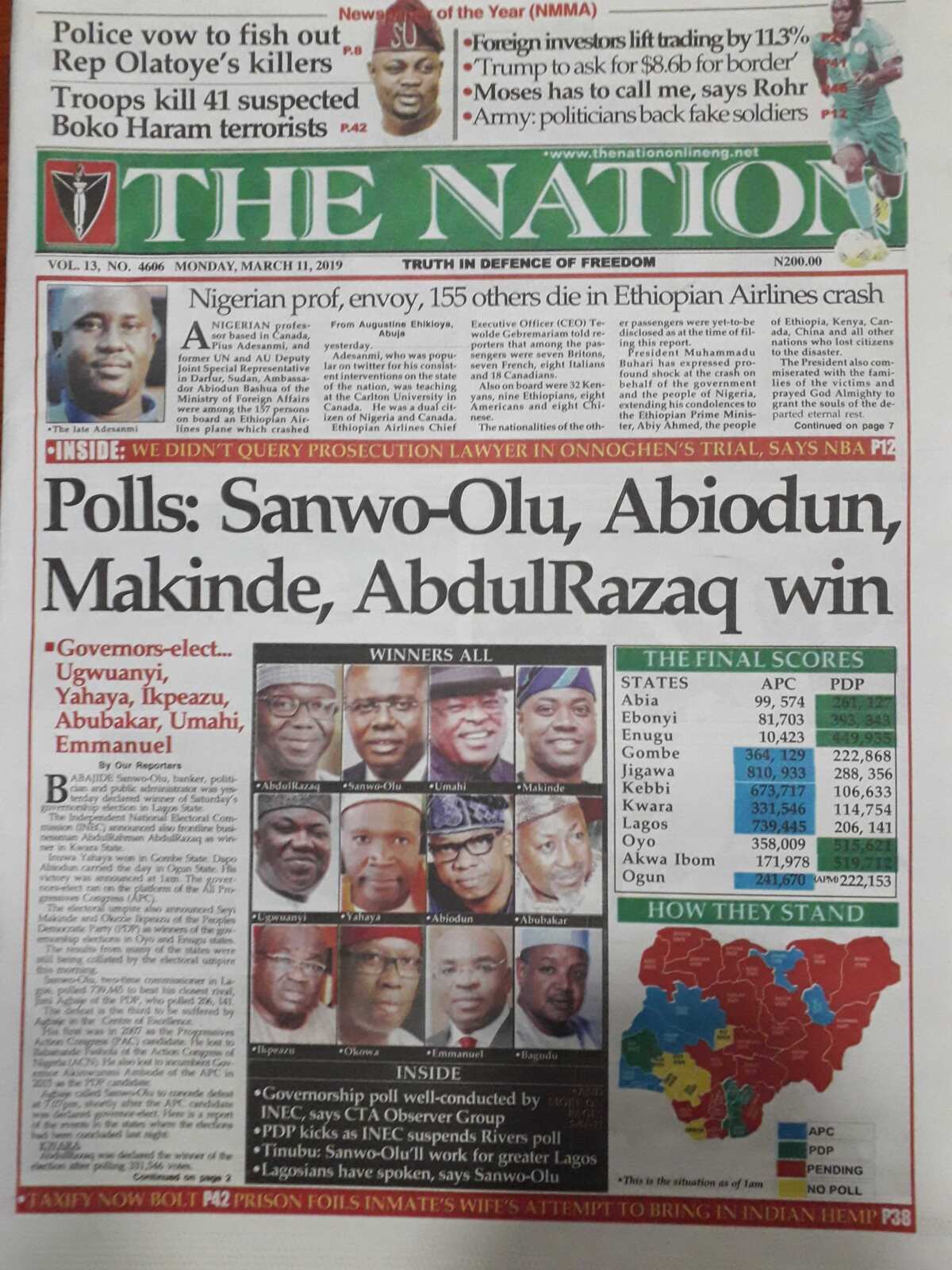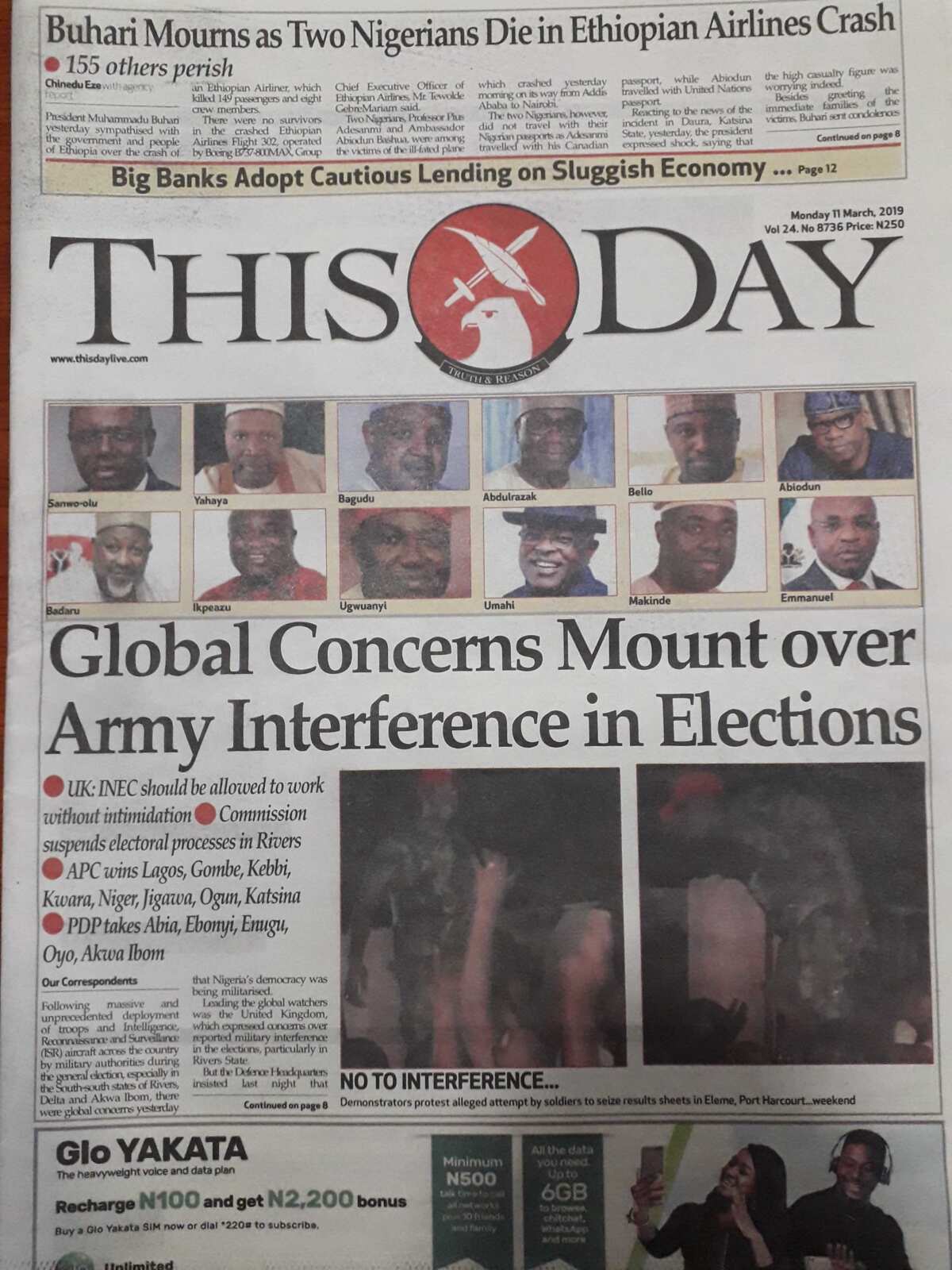Nigerian newspaper review for March 11: Sanwo-Olu, Makinde, others win as INEC halts polls in Rivers
The main headlines of mainstream Nigerian newspapers of Monday, March 11, are focused on the March 9 governorship and state Houses of Assembly elections across the country and concerns over the crises that followed the elections in Rivers state.
The Nation reports that Babajide Sanwo-Olu of the All Progressives Congress (APC) emerged victorious in the Saturday, March 9 governorship election in Lagos state.
AbdulRahman AbdulRazaq was also declared as winner of Kwara state governorship election by the Independent National Electoral Commission (INEC).
In Ogun state, Dapo Abiodun of the All Progressives Congress (APC) defeated Adekunle Akinlade of the Allied People’s Movement (APM). Abiodun polled a total of 241,670 votes while Akinlade got 222,153 votes.
READ ALSO: LIVE UPDATES: Official INEC collation of governorship results
Inuwa Yahaya of the APC also won in Gombe state
INEC also announced Seyi Makinde and Okezie Ikpeazu of the Peoples Democratic Party (PDP) as winners of the governorship elections in Oyo and Enugu states.

The Nation Newspaper for Monday, March 11
Source: UGC
Vanguard reports that the Independent National Electoral Commission suspended all electoral process in Rivers state following reports of widespread violence and disruption of elections in the state.
A statement by a national commissioner and chairman of INEC Information and Voter Education Committee, Dr Festus Okoye, read: “Based on reports from our officials in the field, the Independent National Electoral Commission has determined that there has been widespread disruption of elections conducted on the 9th day of March 2019 in Rivers State.
“These initial reports suggest that violence occurred in a substantial number of polling units and collation centres, staff have been taken hostage and materials including result sheets have either been seized or destroyed by unauthorized persons. In addition, safety of our staff appears to be in jeopardy all over the state and the Commission is concerned about the credibility of the process."
The All Progressives Congress (APC) and the Peoples Democratic Party (PDP) coasted home to victory in their strongholds.

Vanguard Newspaper for Monday, March 11
Source: UGC
This Day on its part reports that there were global concerns that Nigeria's democracy was being militarised following the massive and unprecedented deployment of troops, Intelligence, Reconnaissance and Surveillance (ISR) aircraft across the country by military authorities during the general elections.
The United Kingdom, which is leading the global watchers, expressed concerns over reported military interference in the elections, particularly in Rivers state.

This Day Newspaper for Monday, March 11
Source: UGC
The Guardian also reports that the Independent National Electoral Commission (INEC) suspended all electoral processes in the governorship and House of Assembly elections in Rivers till further notice.
According to the commission, the action was due to widespread violence and disruptions that characterised the Saturday, March 9 elections in the state.
Reacting to the development, the Peoples Democratic Party (PDP) demanded the immediate release of the outcome of the elections to avert serious crisis.
PAY ATTENTION: Install our latest app for Android, read best news on Nigeria’s #1 news app
The national publicity secretary of the PDP, Kola Ologbondiyan, said in a statement: “We want Nigerians to note that the APC is frustrated that it is not on the ballot in the Rivers State election and for that it has resorted to violence, killings and heavy militarisation of the area in the attempt to disrupt the electoral process, seeing that the PDP had already won.’’

The Guardian Newspaper for Monday, March 11
Source: UGC
According to The Punch, the announcement of the governorship and state Houses of Assembly elections results commenced on Sunday, March 10.
The Peoples Democratic Party defeated the All Progressives Congress in the governorship election in Oyo state. The APC candidate, Adebayo Adelabu, lost to Seyi Makinde of the PDP with a margin of 157,635 votes. Makinde polled 515,621 votes while Adelabu got 357,982 votes.

The Punch Newspaper for Monday, March 11
Source: UGC
NAIJ.com (naija.ng) -> Legit.ng We have updated to serve you better
Protect your vote to make it count - PDP Guber Candidate | Legit TV
Source: Legit.ng
from Nigeria News today & Breaking Naija news ▷ Read on Legit.ng 24/7 https://ift.tt/2tXouzm
via EDUPEDIA24/7
Comments
Post a Comment